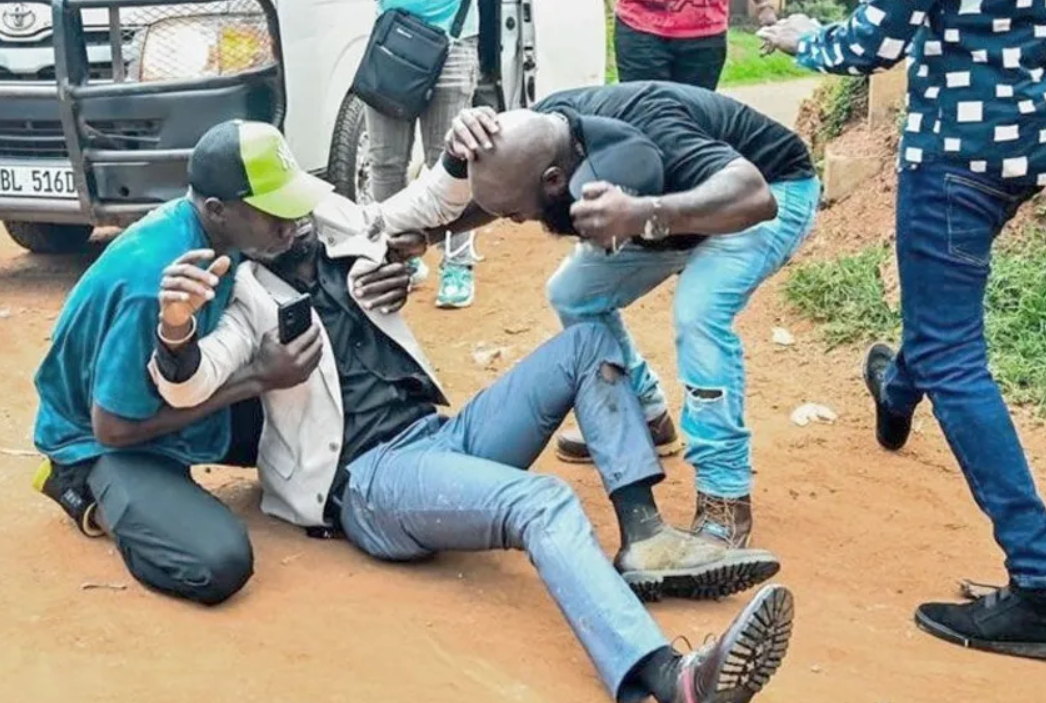Notable political figure and National Unity Platform (NUP) leader Bobi Wine of Uganda suffered a leg injury in a clash with police personnel. The incident that captured everyone’s attention happened in Bulindo, about 20 kilometers north of Kampala, the capital, while Bobi Wine was on his way to meet with his legal team. After allegations circulated that he had been shot, the NUP clarified that a tear gas canister had really hit him. A hospital in Kampala is currently caring for him as he recovers.
Conflicting Accounts and Incident Specifics
Police said the opposition leader tripped over his own feet as he got into his car. Nevertheless, eyewitnesses and Bobi Wine’s party have given contradictory statements. Police officers shot Bobi Wine in the leg, according to the first report on his social media network. Journalist Solomon Serwanjja filmed the opposition leader as he was helped from a building; he was clearly hurt and his left shin was bleeding. X-rays showed that Bobi Wine had tear gas canister parts embedded in her leg; surgeons had to remove the debris, according to NUP spokesman Joel Ssenyonyi.
The incident took place following Bobi Wine’s attendance at a Bulindo function. He allegedly disregarded police advice and led his team in a procession after the event. Bobi Wine’s group ignored police requests that they disband the parade, which sparked an altercation that wounded the opposition leader. According to the police, they stepped in to stop the parade because it was obstructing the route. During the confrontation, police arrested four members of the NUP.
Public Opinion and Reaction from Politicians
Many prominent politicians and human rights activists have spoken out against the incident, expressing their deepest disgust. Kizza Besigye, a seasoned opposition leader, expressed his disapproval of the “usual police aggression against political opposition” and expressed regret over the bloodshed that ensued. As a symbol of defiance against President Yoweri Museveni’s nearly four-decade-long rule, Bobi Wine—real name Robert Kyagulanyi—has gained widespread attention. The opposition leader’s strong stance against governmental persecution and his many brushes with security agents have contributed to his rising popularity, especially among Uganda’s younger generation.
After being elected to the Ugandan parliament in 2017, Bobi Wine initially came to the attention of the political world. In the 2021 presidential election, which he later challenged President Museveni for, there were several accusations of violence, voting intimidation, and state-sponsored repression. As an example of the Ugandan government’s harsh stance toward opposition, Bobi Wine has been physically attacked and arrested multiple times during his political career.
Current Research and Its Prospects
To determine the precise circumstances of Bobi Wine’s injuries, the Ugandan police have declared an investigation into the matter. Opposition supporters, however, continue to have a high level of suspicion, seeing these types of investigations as being biased and lacking in transparency. According to the NUP, the government is harassing and persecuting political opponents and should protect their rights. The group has demanded responsibility from the administration.
This latest clash highlights the larger difficulties encountered by opposition leaders in Uganda, where state security personnel frequently retaliate aggressively to political criticism. As a result of this occurrence, the tense political climate in Uganda has once again come into sharp focus. Opposition parties face difficulties in functioning freely due to the prevalence of state control and intimidation.
The non-life-threatening injury sustained by Bobi Wine is a sobering reminder of how unpredictable Ugandan politics can be. Supporters of the opposition leader and outside observers will be monitoring the Ugandan government’s response to the incident with bated breath to see if it causes any significant shifts in the treatment of political opponents in the country. The leader is now getting ready for surgery.
The ever-changing dynamics of Ugandan politics are a result of President Museveni’s protracted reign and the enduring appeal of opposition figures such as Bobi Wine. A more transparent and democratic political environment in Uganda, devoid of oppression and violence, is a goal that local activists, human rights groups, and the international community persistently pursue.



















